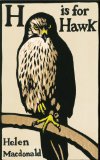Five words from the blurb: goshawk, taming, grief, nature, process
H is for Hawk gives an account of the winter in which the author acquires and trains Mabel, a young goshawk. This period of time coincides with the death of Helen Macdonald’s father so there is an emotional rawness that penetrates everything. Much of her grief is reflected in her attitude towards Mabel and these heightened emotions are beautifully described.
The writing in this book is excellent. I don’t have a special interest in birds, but Helen Macdonald managed to captivate me with her simple story. Emotion bounces from the page and I could vividly imagine every scene she describes:
The landscape is changing before my eyes. What I see is not just winter moving onwards to spring; it is a land slowly filling with spots and lines of beauty. There’s a brittle sun out on the hill this lunchtime, and a fresh westerly wind. Mabel’s pupils shrink to opiated pinpricks as I unhood her, both of her eyes narrow with happiness.
The English countryside has a special place in the heart of this book and I think any nature lover will enjoy reading about the wide variety of flora and fauna. There were some scenes in which the hawk hunts prey. I was impressed by the concentration and speed of these birds and found these scenes exhilarating, but some might find their graphic nature disturbing.
H is for Hawk also includes information about TH White, a man who wrote a book on falconry in the 1930s. It was interesting to see how their lives mirrored each other, but I found these sections less interesting – probably because they lacked the intense emotion of the rest of the book.
Overall this was an impressive book that gave me a new respect for those who train birds of prey. Not much happens, but this didn’t matter as the simple tension of the bird’s unpredictable behaviour was enough to hold my attention. Recommended to anyone who enjoys nature writing.

.


7 replies on “H is for Hawk by Helen Macdonald”
Part of me would really like to read this because I love reading about the English countryside, which is so different from here. But, I think I’d have a major problem with the idea of keeping a hawk captive and ‘training’ it. I think that birds should fly free and we humans should just leave them alone. I can see that it would be an interesting book though.
Violet, Yes, I understand your position, but the hawk in the book gets to do a lot of free flying and uses its natural instinct to hunt all the time. The only training is to keep it safe so it isn’t like many of the sad birds you see cooped up in aviaries all the time. Perhaps you should read it to see if you’re reassured at all?
When I was in college I read a bunch of books about training raptors- it was fascinating. I think I’d like this book.
Jeane, I hope you enjoy it if you decide to give it a try.
Yes, I agree her writing is excellent. I don’t have a particularly great interest in birds either but her descriptions and the connection with her grief makes it so compelling. When I was in Cornwall recently, I was inspired to visit a nearby owl sanctuary partly because of this book. Owls and Hawks have a certain ferocity which gives them a spirit which is compelling in a different way compared to more gentle birds.
Eric, It’s great to hear that you enjoyed this book too. Birds of prey are stunning creatures and this book gave me a far greater understanding of their nature. I look forward to trying her other books at some point in the near future.
I think you’ve pinpointed one of the main values of reading. “I don’t have a special interest in birds, but Helen Macdonald managed to captivate me with her simple story”. I love how books like this can introduce me to completely new worlds that I know nothing or little about.